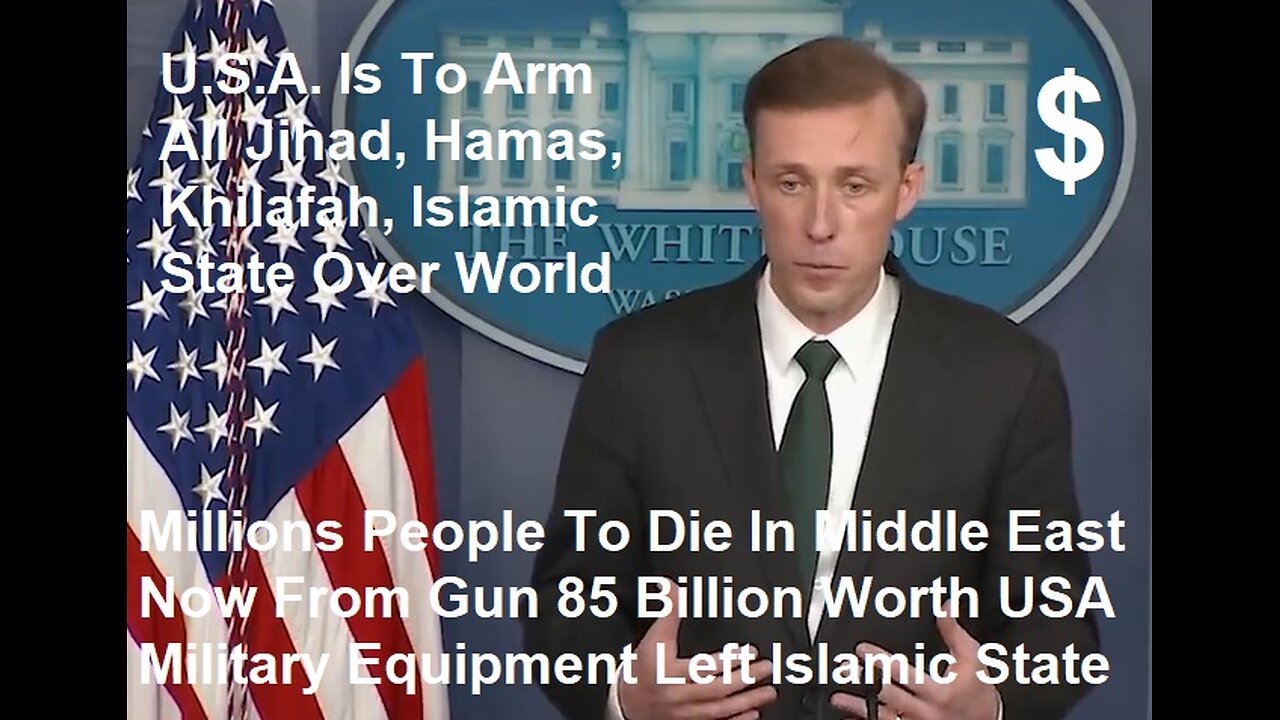Premium Only Content

Millions To Die In Middle East Now From 85 Billion Worth U.S.A. Military Equipment
U.S.A. Abandoned $85 Billions in Military Equipment in Afghanistan ahead of Taliban takeover An indeterminant amount of weapons and munitions were left to the Taliban with the collapse of the Afghan government and now sold all over world now to Jihad Hamas Khilafah Isis Islamic State Freedom Fighters Millions 2 Die Soon With Abandoned Weapons And Munitions Billions In Military Equipment.
The U.S. Department of Defense found that roughly $85 billion worth of military equipment transferred to Afghanistan security forces remained in the country during the Taliban takeover in August 2021.
According to a congressionally mandated DOD report, military assistance delivered to Kabul over the course of 16 years included equipment ranging from air-to-surface missiles, night vision surveillance and Humvees first reported.
The Afghan National Defense and Security Forces (ANDSF), which were trained by the U.S. military, received $18.6 billion worth of equipment from 2005 to the U.S.’s withdrawal in August 2021, defense department spokesperson Army Major Rob Lodewick told Fox News Digital.
Lawmakers on both sides of the aisle have criticized the chaotic withdrawal from Afghanistan that ultimately lead to the death of 13 U.S. service members and the collapse of the Afghan government.
Many on the Hill have also voiced frustration that deadly technology was left in the hands of the very group the U.S. toppled 20 years prior.
"After more than 16 years of combat operations, DOD estimates that $7.12 billion of this equipment remains in Afghanistan in varying states of repair," Lodewick said. "It is important to remember that the $7.12 billion figure cited in the Department’s recent report to Congress corresponds to ANDSF equipment and not U.S. military equipment used by our forces.
"Nearly all equipment used by U.S. military forces in Afghanistan was either retrograded or destroyed prior to our withdrawal and is not part of the $7.12 billion figure cited in the report," he added.
Taliban forces made headlines following the completed U.S. withdrawal in August by parading military equipment that had belonged to the Afghan forces, but it remains unclear how much of the equipment is operable.
Over $923 million worth of aircraft in Afghanistan, including 78 aircraft that were originally procured for the Afghan government, were left at the Hamid Karzai International Airport.
The U.S. military reportedly demilitarized the planes and rendered them inoperable before completely withdrawing from the country, the report stated.
Over 9,500 air-to-surface munitions, valued at over $6.5 million dollars, were left behind following the collapse of the Afghan government. Though the report noted the "significant majority" of the "munitions stock are non-precision munitions."
More than 40,000 of the 96,000 military vehicles given to Afghan authorities were abandoned, including 12,000 Humvees. The DOD report said that an "unknown" number of the vehicles remained operational.
Just under three-quarters of the 427,300 weapons provided to the Afghan forces were left behind along with less than 1,537,000 "specialty munitions" and small arms ammo.
"Nearly all" communications equipment, encryption devices, night vision and other forms of surveillance, demining and explosive detection equipment were also abandoned, the report found.
US general says counter-terrorism efforts are 'more difficult' after Biden's Afghanistan withdrawal Conducting effective counter-terrorism operations is "more difficult" following President Joe Biden's withdrawal of the U.S. military from Afghanistan, U.S. Gen. Richard Clarke testified in the Senate on Tuesday.
Clark, the commander of the United States Special Operations Command (USSOC), testified before the Senate Armed Services Committee regarding Biden's proposed 2023 military budget. Republican Nebraska Sen. Deb Fischer questioned Clarke about the challenges of conducting USSOC counter-terrorism operations in extremist hotbeds without the assets provided by the previous U.S. deployment in Afghanistan.
"Can you describe the challenges of conducting over-the-horizon CT [counter-terrorism] operations without reliable partners on the ground, without basing access in neighboring countries, and without reliable access to airspace?" Fischer asked.
"Senator, it is more difficult," Clarke responded. "And I'm not gonna sit in front of this committee and say that it is not."
"I would also on the same hand, though, say that over the last 20 years we have developed exquisite capabilities, and we can conduct counterterrorism missions over the horizon. We have exhibited that in the past," Clarke continued.
Clarke went on to state that the special forces under his command are capable of over-the-horizon operations, however. He stated the most important factor in effective counter-terrorism is the information gathering that allows operations to take place.
While the vast majority of Americans supported the U.S. withdrawal from Afghanistan, Biden faced heavy criticism for his execution of the operation. He stated ahead of time that the operation would be safe and orderly, but ultimately became deadly and chaotic.
More than a dozen U.S. soldiers were killed in a bombing attack while defending the Kabul airport during frantic evacuation efforts. Footage also showed some desperate Afghan civilians clinging to U.S. aircraft during takeoff, only to fall to their deaths.
Biden's withdrawal left more than a hundred U.S. citizens stranded in Afghanistan under Taliban rule, along with thousands of Afghan allies who had supported the U.S. deployment.
Taliban hard-liners turning back the clock in Afghanistan. The number of directives seem to emulate the harsh rule from the late 1990s Taliban hard-liners are turning back the clock in Afghanistan with a flurry of repressive edicts over the past days that hark back to their harsh rule from the late 1990s.
Girls have been banned from going to school beyond the sixth grade, women are barred from boarding planes if they travel unaccompanied by a male relative. Men and women can only visit public parks on separate days and the use of mobile telephones in universities is prohibited.
It doesn't stop there.
International media broadcasts – including the Pashto and Persian BBC services, which broadcast in the two languages of Afghanistan – are off the air as of the weekend. So are foreign drama series.
Since the Taliban seized control of the country in mid-August, during the last chaotic weeks of the U.S. and NATO pullout after 20 years of war, the international community has been concerned they would impose the same strict laws as when they previously ruled Afghanistan.
The latest assault on women’s rights came earlier this month, when the all-male and religiously driven Taliban government broke its promise to allow girls to return to school after the sixth grade. The move stunned much of the world – and many in Afghanistan – especially after the Taliban had given all "the necessary assurances" that this was not going to happen.
The United Nations has called the banning of international media broadcasts "another repressive step against the people of Afghanistan." The website of the BBC Pashto service said it was "a worrying development at a time of uncertainty and turbulence."
"More than 6 million Afghans consume the BBC’s independent and impartial journalism on TV every week and it is crucial they are not denied access to it in the future," BBC World Services’ head of languages Tarik Kafala said in a statement Sunday.
On Monday, members of the Taliban vice and virtue ministry stood outside government ministries, ordering male employees without traditional turbans and beards – seen as a symbol of piety – to go home. One employee who was told to go home said he didn't know if and when he would be able to return to work. He spoke on condition of anonymity, fearing for his safety.
According to a senior Taliban official and Afghans familiar with the Taliban's leadership, the push to return to the past – which resulted in the edicts – emerged from a three-day meeting last week in the southern city of Kandahar, the birthplace of the Taliban.
They say the edicts stem from the demands of the Taliban's hard-line supreme leader, Haibatullah Akhundzada, who is apparently trying to steer the country back to the late 1990s, when the Taliban had banned women from education and public spaces, and outlawed music, television and many sports.
"The younger among the Taliban do not agree with some of these edicts, but they are not comfortable contradicting the elders," said Torek Farhadi, an analyst who served as adviser to previous Afghan governments. Farhadi, who has been in contact with Taliban officials since their return to power, did not elaborate.
The more pragmatic among the Taliban are resisting the edicts – or at least silently ignoring them, Farhadi said.
Since their takeover of the country, the Taliban have been trying to transition from insurgency and war to governing, with the hard-liners increasingly at odds with the pragmatists on how to run a country in the midst of a humanitarian crisis and an economy in free fall.
The Taliban leadership today is different from the one-man rule of Mullah Mohammad Omar, the reclusive founder of the Taliban movement in the mid-1990s who reigned with a heavy hand. A divide is growing between some within the old guard, who uphold the harsh rule of the past, and a younger generation of Taliban leaders who see a future of engagement with the international community.
The younger generation sees rights for both men and women, though still within their interpretation of Islamic law – but one that allows school for girls and women in the workforce. "The younger Taliban need to speak up," said Farhadi.
Still, Akhundzada has modeled himself on Mullah Omar, preferring to stay in remote Kandahar, far from the eyes of the public, rather than rule from the Afghan capital of Kabul. He also adheres to Pashtun tribal mores – traditions where women are hidden away and girls are married off at puberty.
Akhunzada ran a madrassa, or a religious school, in Pakistan’s border regions before his 2016 rise as the new Taliban leader. Those with knowledge of Akhunzada say he is unconcerned about international outrage over the latest restrictive Taliban edicts and about the growing discontent and complaints from Afghans, who have become increasingly outspoken.
It was Akhunzada who reportedly vetoed the opening of schools to girls after the sixth grade as the Taliban had promised to do in late March, at the start of the new school year. On Saturday, dozens of girls demonstrated in Kabul, demanding the right to go to school.
Ethnic Pashtuns elsewhere have resisted Taliban adherence to tribal laws. In Pakistan, where ethnic Pashtuns also dominate the border regions, movements such as the Pashtun Rights Movement have emerged to challenge backward tribal traditions and disavow Taliban interpretations of Islamic law.
Manzoor Pashteen, the movement's leader, has been an outspoken opponent and has accused the Taliban of hijacking ethnic Pashtun sentiments and misrepresenting their traditions – and misinterpreting them as religious edicts.
Akhunzada's onslaught against progress comes at a time when the health of the Taliban-appointed prime minister, also a hard-liner, Hasan Akhund, is reported to be deteriorating. Akhund did not meet with China's Foreign Minister Wang Yi last week, when the top Chinese diplomat made a surprise one-day visit to Kabul.
Farhadi has hope the younger, more pragmatic Taliban leaders will find their voice and urged for an outreach to them by Islamic countries and scholars, as well as Afghan scholars and political figures. "The Taliban movement needs a reform," said Farhadi. "It is slow to come and it is frustrating for everyone involved. But we mustn’t give up."
Taliban cancels girls’ higher education despite pledges Afghanistan’s Taliban rulers decided against opening schools to girls above the sixth grade, reneging on a previous promise and opting to appease their hard-line base at the expense of further alienating the international community.
The unexpected decision, confirmed by a Taliban official Wednesday, came at the start of the new school year in Afghanistan. It is bound to disrupt Taliban efforts to win recognition from potential international donors at a time when the country is mired in a worsening humanitarian crisis.
The international community has been urging Taliban leaders to open schools and give women their right to public space. A statement by the ministry earlier in the week urged "all students" to come to school.
The decision to postpone a return of girls going to school in higher levels appeared to be a concession to the rural and deeply tribal backbone of the hard-line Taliban movement that in many parts of the countryside are reluctant to send their daughters to school.
The decision to cancel the return of girls to school came late in the night on Tuesday, Waheedullah Hashmi, external relations and donor representative with the Taliban-led administration, told The Associated Press.
"It was late last night that we received word from our leadership that schools will stay closed for girls," said Hashmi. "We don’t say they will be closed forever."
The surprise decision also comes as the movement’s leadership has been summoned to southern Kandahar by the reclusive Taliban leader, Haibatullah Akhunzada, amid reports of a Cabinet shakeup, according to an Afghan leader who is also a member of the leadership council. He spoke on condition of anonymity, because he was not authorized to speak to the media. He said it is possible some of the senior interim Cabinet positions could be changed.
There have been persistent reports since the Taliban swept to power in August of differences among the senior leadership, with the more hard line among the movement at odds with the pragmatists among them. The pragmatists reportedly want to see a greater engagement with the world and while staying true to their Islamic beliefs be less harsh than when they last ruled Afghanistan, banning women from work and girls from schools.
Television is allowed in Afghanistan today, unlike in the past and women are not required to wear the all encompassing burqa but must wear the traditional hijab, covering their heads. Women have also returned to work in the health and education ministry and at Kabul International Airport at passport control and custom.
The Taliban were ousted in 2001 by a U.S.-led coalition for harboring al Qaeda leader Osama bin Laden and returned to power after America’s chaotic departure last August.
Girls have been banned from school beyond Grade 6 in most of the country since the Taliban’s return. Universities opened up earlier this year in much of the country, but since taking power the Taliban edicts have been erratic and while a handful of provinces continued to provide education to all, most provinces closed educational institutions for girls and women. In the capital Kabul private schools and universities have operated uninterrupted.
The religiously driven Taliban administration fears going forward with enrolling girls beyond Grade 6 could alienate their rural base, said Hashmi.
"The leadership hasn’t decided when or how they will allow girls to return to school," Hashmi said. While he accepted that urban centers are mostly supportive of girls education, much of rural Afghanistan is opposed, particularly in tribal Pashtun regions.
In some rural areas a brother will disown a brother in the city if he finds out that he is letting his daughters go to school," said Hashimi, who said the Taliban leadership is trying to decide how to open education for girls beyond grade six countrywide.
Most Taliban are ethnic Pashtuns. In their sweep through the country last year, other ethnics groups, such as Uzbeks and Tajiks in the north of the country, either joined the fight to give the Taliban their victory or simply chose not to fight.
"We did everything the Taliban asked in terms of Islamic dress and they promised that girls could go to school and now they have broken their promise," said Mariam Naheebi, a local journalist who spoke to the Associated Press in the Afghan capital. Naheebi has protested for women’s rights and says "they have not been honest with us."
Exposing Real History Of The Nation Of Islam & Is Not Religion Of Peace And Justice
This is the origins and true history of the NOI, which includes interviews, clips, and historical evidence about major figures in the Black Muslim movement. Some of the things/people mentioned is Noble Drew Ali, Wallace Fard Muhammad, Elijah Muhammad, Malcolm X, Louis (X) Farrakhan, Clarence 13X, Warith Deen Mohammed, Khalid Abdul Muhammad, and most important what the Netfix Documentary "Who Killed Malcolm X?" did NOT tell you about the Assassination of El-Hajj Malik El-Shabazz.
Left-Wing Vs. Right-Wing Ideologies Are Two Political Extremities Stop Killing People
We The People's of Left-Wing and Right-Wing ideologies and are two political extremities that differ in their outlook and applications. Left-wing beliefs are liberal in that they believe society is best served with an expanded role for the government, while people on the right believe that the best outcome for society is achieved when individual rights and civil liberties are paramount and the role and especially the power of the government is minimized.
Left-wing is characterized by equality, freedom, rights, progress, and reform, while right-wing is characterized by duty, hierarchy, authority, order, tradition, and nationalism. In terms of economic policies, right-wing believes there should be less government regulation on business and that private enterprise is the best way to stimulate economic growth, while left-wing believes in more government regulation to prevent abuses by businesses and that a mixed economy is best for growth. Right-wing politics is centered around beliefs that certain social orders and hierarchies are inevitable and natural, with this belief being supported by natural law or tradition.
Child Male-To-Female Gender Affirmation Total Laparoscopic Sigmoid Vaginoplasty
Child Male-To-Female Gender Affirmation And California bill highlighting gender affirmation in child custody cases moves forward. California lawmakers in the State Senate Judiciary Committee on Tuesday moved forward with a measure that would require courts to consider a parent's acceptance of their child's gender identity in custody or visitation cases. U.S.A. New Sharia Law Rules 2022 and Kids Gender Affirming Hormone Therapy Rules 2023 Kids Can Now Start At Age 8 Yrs. Old Puberty Blockers Drugs Per The President Biden's Administration has confirmed that the legal age of consent for oral sex and to marriage will be lowered to age 8 yrs old starting Feb. 14th. 2023
Secrets Meeting Biden Said New U.S.A. Laws Coming Age of Consent Is To Be 8 Yrs. Old
UN Report Calls For Decriminalization Of Sex Between Adults/Children Age 8+Up
UN New Legal Principles Launched On International Women’s and Trans Women Day to advance decriminalization efforts In March 2023
tps://web.archive.org/web/20230416234047/https://icj2.wpenginepowered.com/wp-content/uploads/2023/03/8-MARCH-Principles-FINAL-printer-version-1-MARCH-2023.pdf
“As the mother of a trans child, it is jarring to know that TGI youth are at a higher risk of depression, mental health crises, self-harm and suicide than their cisgender peers,” said Assembly member Lori Wilson, the bill's author, in a statement. “The TGI Youth Empowerment Act provides California the opportunity to take one step closer to building a safer, more dignified, and equitable world for TGI youth and their families.”
Muhammad Married A 9-Year-Old Lady Ayesha Because Messenger of God Said So
Is it true that Muhammad married a child bride by the name of Ayesha when he was 53 and she was 9 years old? If so, how do Muslims justify this from their “exemplary” Prophet? The well-established, but not altogether agreed upon, tradition of Lady Ayesha’s age at the time of marrying Prophet Muhammad comes from a hadith in one of the most authentic collections – Sahih al-Bukhari in which Ayesha, herself, states: “The Messenger of God married me when I was six, and consummated the marriage with me when I was nine.”
American Muslims Facts vs. Fiction vs. Islamic Militant Organization vs, Sharia Law
American Muslims Facts vs. Fiction is an 11-minute film that uses research from The Gallup Organization, The Pew Forum, Institute for Social Policy and Understanding, The U.S. Counterterrorism Center and other leading research organizations to address questions Americans ask about their Muslim neighbors. The film debunks stereotypes and separates many of the prevailing fictions about Islam and American Muslims by featuring leading researchers, religious authorities and the results of studies conducted by these organizations.
Why Do Far-Right Groups Burn The Quran or Is Quran Hate Propaganda Question
Several far-right and anti-Muslim groups in Sweden, Norway and the Netherlands burned copies of the Quran in public places in 2022. Anti-fascist demonstrators outnumbered far-right supporters more than 20 to one in Denmark as an English Defence League-led attempt to form a pan-European movement was humiliated. Estimates suggested as few as 160 defence league members from several countries gathered at the inaugural far-right summit in Aarhus for the European counter-jihad meeting, devised to "send a clear message to the leaders of Europe" that Islamism would not be tolerated.
Islam And The Undeniable Truth - Jihadists and Islamic State Say Death To America !
Undeniable Truth 1400 years of Islam history in a few minutes from Brigitte Gabriel was born in the Marjeyoun District of Lebanon to a Maronite Christian couple, a first and only child after over twenty years of marriage. She recalls that during the Lebanese Civil War, Islamic militants launched an assault on a Lebanese military base near her family's house and destroyed her home. Gabriel, who was ten years old at the time, was injured by shrapnel in the attack. She says that she and her parents were forced to live underground in all that remained, an 8-by-10-foot (2.4 by 3.0 m) bomb shelter for seven years, with only a small kerosene heater, no sanitary systems, no electricity or running water, and little food. She says she had to crawl in a roadside ditch to a spring for water to evade Muslim snipers.
Islamic Law and Courts Are Alive and Well in U.S.A. vs. USC 1st Amendment Laws
Americans often react to the idea of Sharia with horror and repugnance. That isn’t warranted. The complex interplay between American society and immigrants’ religious beliefs has a long and rich history in the U.S.A. Teenage Girls Who are forced to marry. Hands amputated as punishment for theft.
Although Muslim women are more likely to have their daughter circumcised, the findings suggest the importance of a collective rather than individual Muslim identity for the continuation of the practice. Keywords 200,000+female genital cutting a year, intergenerational transmission, convention theory, Burkina Faso Female genital cutting, also known as female genital mutilation or female circumcision, is a term used to describe operations on female genitalia ranging from a small nick in the clitoris to total removal of the clitoris and labia.
Terror Slavery Chronicles & Other Woman Escapes Sexual Slavery Auction ** GRAPHIC **
So Terror Slavery Groups ISIS and U.S.A. and Others Wide World Groups Now Has Sex Slave Rape and Death Guidelines and Slavery Chronicles and There is maps of underground sex-slave bars in the American. Always fascinated by the concept of human slavery and how it worked. (So far I've have seen over 60,000+ ISIS or Muslim and Others auction-block sex slave ad) How was it own a human and see him/her as just a property. How was it to be owned, right-less by law, being bought and sold side by side to other animals. How was it to be part of a community where, by pure luck mostly, you might own every thing and live as a king without any effort, or you might own nothing even yourself So Here I Imagine a world where slavery became legal again. I write some times as a master/mistress, sometimes as a slave and some times as just an observer. I will even share some posts of interest, and write some true historical excerpts about slavery. Excuse my English, I am not a native speaker P.S. It is pure fantasy Just when you thought ISIS couldn’t get any worse, they have now put out guidelines for how to rape your sex slaves. "Islamic State theologians have issued an extremely detailed ruling on when "owners" of women enslaved by the extremist group can have sex with them, in an apparent bid to curb what they called violations in the treatment of captured females.
Currently listed entities
This webpage has been prepared for reference only. Users should consult the Acts as passed by Parliament, which are published in the "Assented to" Acts service, Part III of the Canada Gazette and the annual Statutes of Canada. Users should also consult the regulations, as registered by the Clerk of the Privy Council and published in Part II of the Canada Gazette, available in most public libraries.
Several of the listed entities are known under different names. As well, some spellings of names may differ. Click on the name for a description of the entity, all different names and spellings, and the date when the entity was added to the list.
https://www.publicsafety.gc.ca/cnt/ntnl-scrt/cntr-trrrsm/lstd-ntts/crrnt-lstd-ntts-en.aspx
The listing of an entity is a public means of identifying a group or individual as being associated with terrorism. The definition of an entity includes a person, group, trust, partnership or fund, or an unincorporated association or organization. The Anti-Terrorism Act provides measures for the Government of Canada to create a list of entities.
It is not a crime to be listed. However, one of the consequences of being listed is that the entity's property can be the subject of seizure/restraint and/or forfeiture. In addition, institutions such as banks, brokerages, etc. are subject to reporting requirements with respect to an entity's property and must not allow those entities to access the property. These institutions may not deal or otherwise dispose of the property. It is an offence to knowingly participate in or contribute to, directly or indirectly, any activity of a terrorist group. This participation is only an offence if its purpose is to enhance the ability of any terrorist group to facilitate or carry out a terrorist activity.
Currently listed entities in XML format RSS
Abdallah Azzam Brigades (AAB)
Abu Nidal Organization (ANO)
Abu Sayyaf Group (ASG)
Al-Ashtar Brigades (AAB)
Al-Murabitoun
Al-Muwaqi'un Bil Dima
Al Qaida
Al Qaida in the Arabian Peninsula (AQAP)
Al Qaida in the Indian Subcontinent (AQIS)
Al Qaida in the Islamic Maghreb (AQIM)
Al Shabaab
Al-Aqsa Martyrs' Brigade (AAMB)
Al-Gama'a al-Islamiyya (AGAI)
Ansar al-Islam (AI)
Ansar Dine
Armed Islamic Group (GIA)
Aryan Strikeforce
Asbat Al-Ansar (AAA) (The League of Partisans)
Atomwaffen Division
Aum Shinrikyo
Blood & Honour (B&H)
Babbar Khalsa International (BKI)
Boko Haram
Caucasus Emirate
Combat 18 (C18)
Ejército de Liberación Nacional (ELN)
Euskadi Ta Askatasuna (ETA)
Fatemiyoun Division (FD)
Front de Libération du Macina
Fuerzas Armadas Revolucionarias de Colombia (FARC)
Gulbuddin Hekmatyar
Gulbuddin Hekmatyar's Faction of the Hezb-e Islami, Hezb-e Islami Gulbuddin (HIG)
Hamas (Harakat Al-Muqawama Al-Islamiya) (Islamic Resistance Movement)
Haqqani Network
Harakat al-Sabireen (HaS)
Harakat ul-Mudjahidin (HuM)
HASAM (Harakat Sawa'd Misr)
Hay'at Tahrir al-Sham
Hizballah
Hizbul Mujahideen
Indian Mujahideen (IM)
International Relief Fund for the Afflicted and Needy - Canada (IRFAN – CANADA)
International Sikh Youth Federation (ISYF)
Islamic Movement of Uzbekistan (IMU)
Islamic Revolutionary Guard Corps' Qods Force
Islamic State
Islamic State – Bangladesh
Islamic State – Democratic Republic of the Congo
Islamic State East Asia
Islamic State in the Greater Sahara
Islamic State – Khorasan Province (ISKP)
Islamic State in Libya
Islamic State – Sinai Province (ISSP)
Islamic State West Africa Province
Jaish-e-Mohammed (JeM)
Jama’at Nusrat Al-Islam Wal-Muslimin
James Mason
Jaysh Al-Muhajirin Wal-Ansar (JMA)
Jemaah Islamiyyah (JI)
Kahane Chai (Kach)
Kurdistan Workers Party (PKK)
Lashkar-e-Jhangvi (LJ)
Lashkar-e-Tayyiba (LeT)
Liberation Tigers of Tamil Eelam (LTTE)
Movement for Oneness and Jihad in West Africa (MOJWA)
Palestine Liberation Front (PLF)
Palestinian Islamic Jihad (PIJ)
Popular Front for the Liberation of Palestine - General Command (PFLP-GC)
Popular Front for the Liberation of Palestine (PFLP)
Proud Boys
Russian Imperial Movement
Sendero Luminoso (SL)
Taliban
Tehrik-e-Taliban Pakistan (TTP)
The Base
Three Percenters
World Tamil Movement (WTM)
Country Reports on Terrorism 2019 is submitted in compliance with Title 22 of the United States Code, Section 2656f (the “Act”), which requires the Department of State to provide to Congress a full and complete annual report on terrorism for those countries and groups meeting the criteria of the Act.
In 2019, the United States and our partners made major strides to defeat and degrade international terrorist organizations. Along with the Global Coalition to Defeat ISIS, in March, the United States completed the destruction of the so-called “caliphate” in Iraq and Syria. In October, the United States launched a military operation that resulted in the death of Abu Bakr al-Baghdadi, the self-proclaimed “caliph” of ISIS. As part of the maximum pressure campaign against the Iranian regime – the world’s worst state sponsor of terrorism – the United States and our partners imposed new sanctions on Tehran and its proxies. In April, the United States designated Iran’s Islamic Revolutionary Guard Corps (IRGC), including its Qods Force, as a Foreign Terrorist Organization (FTO) – the first time such a designation has been applied to part of another government. And throughout the year, a number of countries in Western Europe and South America joined the United States in designating Iran-backed Hizballah as a terrorist group in its entirety.
Despite these successes, dangerous terrorist threats persisted around the world. Even as ISIS lost its leader and territory, the group adapted to continue the fight from its affiliates across the globe and by inspiring followers to commit attacks. In Africa, ISIS formally recognized a number of new branches and networks in 2019, and ISIS-affiliated groups were active across the continent, including in the Sahel, the Lake Chad region, and East Africa. In South and Southeast Asia, ISIS affiliates carried out attacks and inspired others to do so as well. The ISIS-inspired attacks in Sri Lanka on Easter Sunday killed more than 250 innocent victims, including five U.S. citizens, representing one of ISIS’s deadliest attacks ever.
The Iranian regime and its proxies continued to plot and commit terrorist attacks on a global scale. In the past, Tehran has spent as much as $700 million per year to support terrorist groups, including Hizballah and Hamas, though its ability to provide financial support in 2019 was constrained by crippling U.S. sanctions. The regime was directly involved in plotting terrorism through its IRGC and Ministry of Intelligence and Security, including plots in recent years in North and South America, Europe, the Middle East, Asia, and Africa. Tehran also continued to permit an al-Qa’ida (AQ) facilitation network to operate in Iran, sending money and fighters to conflict zones in Afghanistan and Syria, and it still allowed AQ members to reside in the country. Finally, the Iranian regime continued to foment violence, both directly and through proxies, in Bahrain, Iraq, Lebanon, Syria, and Yemen.
https://www.state.gov/reports/country-reports-on-terrorism-2019/
In 2019, the United States and its partners pursued AQ around the world. The organization faced a significant setback with the elimination of Hamza bin Laden, Usama bin Laden’s son and a rising AQ leader. Yet the group and its associated forces remained resilient and continued to pose a threat in Africa, the Middle East, and elsewhere. Al Shabaab in the Horn of Africa, Jama’at Nasr al-Islam wal Muslimin in the Sahel, and Hay’at Tahrir al-Sham/Al-Nusrah Front in Syria are among the world’s most active and dangerous terrorist groups. In December, a member of the Royal Saudi Air Force opened fire at Naval Air Station Pensacola in Florida, where he was receiving training, killing three people and wounding eight. Before the shooting, the gunman had coordinated with al-Qa’ida in the Arabian Peninsula (AQAP), which claimed credit for the attack. Today, AQ’s network continues to exploit under-governed spaces, conflict zones, and global security gaps to recruit, fundraise, and plot attacks.
The threat posed by racially or ethnically motivated terrorism (REMT), particularly white supremacist terrorism, remained a serious challenge for the global community. Continuing a trend that began in 2015, there were numerous deadly REMT attacks around the world in 2019, including in Christchurch, New Zealand; Halle, Germany; and El Paso, Texas.
Amid this diverse and dynamic threat landscape, the United States continued its longstanding role as the world’s counterterrorism leader, taking decisive action to combat these threats and rallying its allies and partners to contribute to the fight.
In September, President Trump issued Executive Order 13886, enabling the Departments of State and the Treasury to more effectively sanction the leaders of terrorist organizations and those who participate in terrorist training. This was the most significant update of the federal government’s terrorist designation authorities since the aftermath of the 9/11 attacks. In May, the United States led a successful campaign at the UN Security Council’s 1267 Sanctions Committee to designate ISIS-Khorasan, the first ISIS affiliate ever listed at the UN.
In another historic action, the U.S. Department of State designated Iran’s IRGC as an FTO in April 2019. This unprecedented step reflected the Iranian regime’s unique place among the governments of the world in its use of terrorism as a central tool of its statecraft. In response to a wave of Iranian terrorist plots in Europe in 2018, the United States launched the Countering Transnational Terrorism Forum (CTTF) in 2019. The CTTF brought together law enforcement officials, prosecutors, and financial practitioners from more than 25 countries to disrupt Iranian terrorist activities and networks.
The United States also continued to spearhead high-level diplomatic engagement on Hizballah — an Iran-backed terrorist group that is based in Lebanon but that has a truly global reach. Throughout the year, the United States ratcheted up efforts to degrade and disrupt Hizballah’s finances, with numerous designations of financial entities, facilitators, and money launderers tied to the group. In July, the United States and Argentina co-hosted the second Western Hemisphere Counterterrorism Ministerial, which commemorated the 25th anniversary of Hizballah’s attack on a Jewish cultural center in Buenos Aires. This engagement yielded concrete results. In 2019, Argentina, Kosovo, Paraguay, and the United Kingdom all joined the United States in designating the entirety of Hizballah as a terrorist organization, rejecting the false distinction between its “military wing” and a purportedly “political wing.”
Another major line of effort for 2019 was the repatriation, prosecution, and rehabilitation of ISIS fighters and family members to prevent them from ever returning to the battlefield. Since 2011, more than 40,000 foreign terrorist fighters (FTFs) from nearly a hundred countries swarmed into Syria and Iraq, and about 2,000 of these FTFs were captured and detained by the Syrian Democratic Forces (SDF). The United States has led by example, bringing back our citizens and prosecuting them where appropriate. As of December 2019, the United States repatriated a total of 23 U.S. citizens from Syria and Iraq – eight adults and 15 children – and the Department of Justice charged six of the adults with a variety of terrorism-related crimes. Those numbers include 15 U.S. citizens repatriated in 2019 (five adults and 10 children; three of the adults have been charged by the Justice Department).
The United States continued to call on other countries to follow our example and repatriate their own citizens, and we assisted a number of partners in doing so. The State Department deployed technical experts to Jordan, Kazakhstan, Kosovo, Kyrgyzstan, the Maldives, North Macedonia, and Trinidad and Tobago to help develop effective protocols and programs for the rehabilitation and reintegration of FTF family members. Working closely with the Departments of Justice and Defense, the State Department also mobilized the international community to more effectively use battlefield evidence in criminal investigations and prosecutions, including training partner countries on how to collect, store, and transfer battlefield evidence. This has enabled the United States to more readily share battlefield evidence with our foreign partners. Other governments and institutions – including NATO, INTERPOL, and the UN – are now taking steps to improve their own efforts as well.
The United States also played a major role in building our partners’ capabilities to detect, disrupt, and dismantle terrorist networks. Our goal was to enable governments on the front lines to address the terrorist threats they face on their own, without needing to rely on the United States in the future. Key lines of effort included information sharing, aviation and border security, countering terrorist radicalization and recruitment, crisis response capability, countering terrorism finance, repatriating FTFs, countering Iran-backed terrorist groups, and law enforcement “finishes” – arresting, prosecuting and incarcerating terrorists.
The United States also leveraged multilateral organizations to advance key U.S. counterterrorism priorities. In September, the 30-member Global Counterterrorism Forum (GCTF) adopted a new series of good practices to assist countries in meeting their watchlisting and screening obligations under UN Security Council Resolution 2396, a landmark resolution spearheaded by the United States in 2017. The GCTF developed and adopted new guiding principles – and accompanying policy, legal, and technical tools – to counter terrorist use of unmanned aerial systems against civilian targets. Together with Chile, the United States launched the Inter-American Network on Counterterrorism through the Organization for American States’ Inter-American Committee on Terrorism (OAS/CICTE). This network will enable participating OAS members to share information on a 24/7 basis to respond more effectively to terrorist threats.
The United States engaged a host of international partners – from governments to local religious leaders to tech companies – to counter terrorist radicalization and recruitment, both online and offline, and to help develop messaging strategies and counter disinformation and propaganda. We supported international initiatives, including the Strong Cities Network, which trained more than 200 municipal leaders from dozens of cities through multiple workshops and exchanges. Approximately 20 cities adopted new policies and practices to counter terrorist radicalization, including the forming of the Task Force Against Hate, to specifically counter REMT.
These efforts are only a snapshot of our ongoing work to protect the United States and our allies from the scourge of terrorism. Country Reports on Terrorism 2019 provides a detailed review of last year’s successes and the ongoing challenges facing our country and our partners. As we look to 2020 and beyond, the United States and our partners remain deeply committed to the global counterterrorism fight.
Ambassador Nathan A. Sales
Coordinator for Counterterrorism
Palestine is a small region of land that has played a prominent role in the ancient and modern history of the Middle East. The history of Palestine has been marked by frequent political conflict and violent land seizures because of its importance to several major world religions, and because Palestine sits at a valuable geographic crossroads between Africa and Asia. Today, Arab people who call this territory home are known as Palestinians, and the people of Palestine have a strong desire to create a free and independent state in this contested region of the world. At some point in evolutionary history, human beings came to understand, as no non-human animals do, that death brings to an end a person's bodily and mental presence in the world. A potentially devastating consequence was that individuals, seeking to escape physical or mental pain, might choose to kill each other. Even accidental killing, or "thou shalt not kill," is expressly prohibited in Numbers 35:33. If the killing is accidental, the accused must flee to one of the cities of refuge—and remain in that city until the high priest dies, or the "revenger of blood" can kill the accused with no legal repercussions.
Israeli-Palestinian 5,000 Years Conflict On Going Now And Why Is It After 5,000 Years Its Still Going On ? Remember God Said "Thou Shalt Not Kill," is expressly prohibited in Numbers 35:33 And Quran, Verse 5:32 Say ? According to the Quran, "Thou shalt not kill" is a commandment that applies to killing only for a just cause. The commandment does not specify whether it applies to communists or Islamic believers. Scholars agree that "Thou shalt not murder" is the proper translation of "Thou shalt not kill" in Exodus 20:13. However, not all Christians refer to it as the sixth commandment. The Ten Commandments are listed twice in the Old Testament, with "Thou shalt not kill" appearing in Exodus 20:13 and Deuteronomy 5:17.
According to Quranic verse 5:32, Allah decreed upon the Children of Israel that whoever kills a soul unless for a soul or for corruption in the land - it is as if he had slain mankind entirely. The verse is often cited by duaah in the wake of Islamic terrorist attacks and massacres as proof that the Qur'an forbids senseless slaughter. The Hirabah verse specifies punishment for those who wage war against God and His Messenger and strive to spread disorder in the land. The verbal noun form irabah is frequently used in classical and modern books of Islamic jurisprudence, but neither the word irabah nor the root verb araba occurs in the Quran.
And do not kill anyone which Allaah has forbidden, except for a just cause. And whoever is killed (intentionally with hostility and oppression and not by mistake), We have given his heir the authority [to demand qisaas Law of Equality in punishment or to forgive, or to take Diya (blood money)]. But let him not exceed limits in the matter of taking life (i.e., he should not kill except the killer only).
-
 5:19
5:19
What If Everything You Were Taught Was A Lie?
14 days agoUnited States Is A Corporation And There Are Two Constitutions Greatest Conspiracy On Earth
3.65K7 -
 48:17
48:17
Athlete & Artist Show
8 days agoS5E1: Chucky Announces First Kid, 4 Nations Face Off, and more!
818 -
 38:30
38:30
hickok45
3 hours agoSunday Shoot-a-Round # 269
1.37K4 -
 1:39:55
1:39:55
Squaring The Circle, A Randall Carlson Podcast
22 hours ago#040 Humanity's Expansion Into The Cosmos: A New Age - Squaring The Circle
2.3K3 -
 12:54
12:54
ariellescarcella
13 hours agoYou're NOT Queer, Just Annoying And Boring
4392 -
 18:57
18:57
Fit'n Fire
9 hours agoA PDW That Thumps -- Stribog SP45A3 45ACP
9621 -
 LIVE
LIVE
Game On!
13 hours ago $0.49 earnedAnother Sunday Without Football...
702 watching -
 17:53
17:53
Forrest Galante
14 hours agoHow I Joined a Dangerous Remote Tribe (feat. Nelk Boys)
74.3K12 -
 LIVE
LIVE
Vocalot
1 day agoDay 6! New Here! New Rumble Friends!? 🤙
1,161 watching -
 34:27
34:27
The Connect: With Johnny Mitchell
19 hours ago $14.90 earnedCan He Stop Them? Inside Trumps War On Mexican Drug Cartels & The New Era Of Mexican Organized Crime
46.7K24